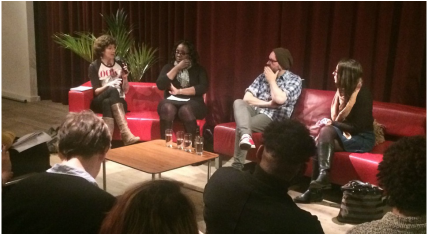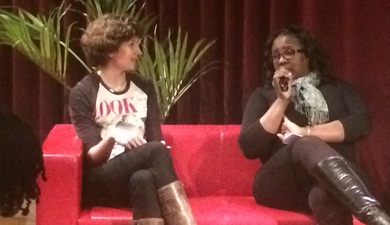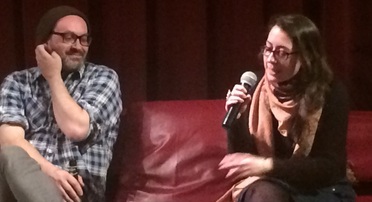|
To say that there is a problem with the lack of diversity in the film industry is to state the depressingly obvious. On Wednesday 11th February at the BFI, we didn’t want to do that. Instead, an inspiring panel that included Folasade Oyeleye, Philip Ilson and Elhum Shakerifar highlighted the filmmakers and festivals that are championing storytelling from all backgrounds. With practical advice and keen observations from their collective experience, the panel were joined by a dynamic group of people attending the event, with the single objective of changing the way the industry looks. Diversity covers a vast number of factors, and those underrepresented by the mainstream include women, all ethnicities, those with disabilities and all sexualities – anything that is not the white, male, middle class that fills the roles in front of and behind camera almost by default. Though initiatives are set up with regularity, and certainly within short film the variety is much healthier, as reflected in the statistics (38% of films screened at London Short Film Festival in 2012 were directed by women) these rarely filter in the feature-length formats (1% of feature films distributed in the same year in the UK were directed by women). Philip: “Where are the women directing features?” We know the talent is there. The will and ability to tell stories of all kinds exists. But somehow the funding, distribution and recognition at feature level remain lacking. While most festivals aim to give a platform to quality first and foremost, and while some filmmakers may find it both patronising and frustrating to be pigeon-holed in respect of their “difference”, prejudice remains, and deserves to be in the spotlight. We know it is in danger of being discouraged, or ignored entirely otherwise. Recent advice from The Academy on how to make a short film that is likely to be selected for their Best Short Film category included: avoid the subject of homosexuality! Festivals and awards ceremonies have an obligation to ensure they are giving a platform to the best films, and while flawed, quota systems, and festivals dedicated to platforming the work of diverse groups, such as the UnderWire Festival can ensure that work which would otherwise not be exhibited, can be shown and rewarded. Though “Selma” has proved to be a landmark film in the career of Ava Du Vernay, her equally well directed first film “Middle of Nowhere” failed to even get distribution. This prompts the frustration many feel at being required to tell stories limited to certain subject matter, and skews perceptions of what is then being represented, as well as the abilities of the filmmaker. As Folasade noted: ““Selma” is a film made by a great team. The fact that [Ava Du Vernay] is a black woman is a bonus.” As audiences we have the power to influence films that come into production by seeking out films that reflect the diversity on and off screen that we want to support, and going to see them in the cinema – preferably on opening weekend. For now, it may be harder to find the films, given they can’t compete with the $100m marketing budget of a film like Inception, but it is the language that distributors and studios understand best if the face of the mainstream is to change. Elhum: “If we’re not part of the mainstream, we’re not visible.” And as filmmakers, there is simply no point in waiting for change – each of us has a responsibility to write what we want to see, being specific at script stage about the diversity that you want your story to show. David Oyelowo being interviewed about his role as Dr Martin Luther King in Selma recently remarked “The only way I get a leading role in a studio picture is if Ryan Gosling can’t play it... If this was a non-colour-specific character, it wouldn’t be me. It just wouldn’t.” so with this as an assumption, it is important to specify difference. As the Geena Davis Institute research demonstrates 17% of characters in movie crowd scenes are women: so state that your crowd is made up of 50% women, as it simply will not happen otherwise! Similarly, give diversity to your script by reflecting different genders, ethnicities and sexualities in the supporting and background characters such as doctors, taxi drivers, teachers, scientists, politicians, bosses, etc.
With a final word from Folasade: “We work in a competitive industry, but we need to be independent and make the films we want to the best of our ability.” LINKS There were a number of films and resources mentioned during the event, which I would like to invite you to check out below. Opportunity and Community: Act for Change: https://www.facebook.com/pages/The-ACT-FOR-CHANGE-Project/1411969842407566?fref=ts Creative Skillset: http://creativeskillset.org/ Radio 4 open for submissions (closes Feb 13th!): http://www.bbc.co.uk/programmes/articles/3rg0TYwrP43PLwL7S1jqVwC/submission-guidelines-2015 Films COMING SOON: Appropriate Behaviour: http://www.imdb.com/title/tt3077108/?ref_=nv_sr_1 Girlhood: http://www.imdb.com/title/tt3655522/?ref_=nv_sr_1 Films we may have missed: Suzanne: http://www.imdb.com/title/tt2298416/?ref_=fn_al_tt_3 Middle of Nowhere: http://www.imdb.com/title/tt1211890/?ref_=nm_flmg_dr_6 Innocence: http://www.imdb.com/title/tt0375233/?ref_=fn_al_tt_4 Obvious Child: http://www.imdb.com/title/tt2910274/?ref_=nv_sr_2 Jennifer Reeder: http://thejenniferreeder.com/ Biogs of speakers: Folasade Oyeleye is a film and television editor. She has edited feature films, television drama and documentaries. She is currently editing a feature length documentary ‘Looking For Love’ with the renowed director Menelik Shabazz. She is an associate lecture at the LFS and has lectured in the craft of editing at the LFS and LCC and has worked with Creative Skillset on policy for film training. She was also a regular panellist on the selection committee for the Editing MA at the NFTS. Philip Ilson is the Director of the London Short Film Festival, which he co-founded in 2004. He is also the short film programmer for the BFI London Film Festival, and has worked as a freelance programmer, including at the East End Film Festival, London, Cork Film Festival, Ireland, and the Branchage Festival, Jersey, Latitude music festival, and at Curzon Soho Cinema. Elhum Shakerifar is a creative producer of film – recent credits include award-winning features The Runner (Saeed Taji Farouky, 2013) and The Reluctant Revolutionary (Sean McAllister, 2012), which opened the Panorama Dokumente in Berlin 2012 – and photography –The Grey Line (Jo Metson Scott, 2013) named in TIME, Guardian and Telegraph’s top photography books of 2013. Elhum also programmed the Bird’s Eye View Film Festival from 2012 to 2014. She is a research fellow at the Department of Anthropology at Goldsmiths University, was part of the British Council Cultural Leadership scheme in 2011, and was recently selected as one of Lighthouse’s 2014 Guiding Lights. The event was chaired by Gabriella Apicella, one of Euroscript's Directors.
0 Comments
|
BLOGTHE ONLY PLACE TO TALK ABOUT THE CRAFT OF SCRIPTWRITING.
|
Privacy Policy © Euroscript Limited 2020




 RSS Feed
RSS Feed


